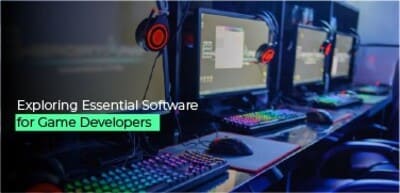Exploring Essential Software for Game Developers
Software tools play a pivotal role in bringing virtual worlds to life. From creating captivating visuals to implementing complex gameplay mechanics, game development software empowers game developers to unleash their creativity and craft immersive gaming experiences. This blog explores the essential software categories video game developers use, shedding light on their functions and providing guidance on choosing the right tools for aspiring game developers.


What is Game Development/Design Software?
Game development/design software refers to a suite of specialized tools and applications tailored for creating, designing, and programming video games. These software for game developers provide developers with a comprehensive set of features and functionalities, enabling them to build games from scratch or modify existing ones.
Game Engines
Game engines are the heart and soul of game development. They provide a framework for creating and running games, offering a wide range of tools and functionalities. Popular game engines like Unreal Engine and Unity game engine empower game developers to design visually stunning environments, implement physics simulations, manage audio assets, and script complex gameplay events.
Version control software
Version control software is an indispensable tool for managing collaborative game development projects. It allows multiple game developers to work together seamlessly by tracking changes, merging code modifications, and maintaining a history of revisions. Tools like Git and Subversion enable teams to collaborate effectively, avoid conflicts, and ensure a smooth development process.
Other Software
- 3D Modeling and Animation Software: Applications like Autodesk Maya and Blender empower game developers to create intricate 3D models, characters, and environments. These design software tools offer a wide range of modeling and animation capabilities, allowing developers to bring their game assets to life.
- Integrated Development Environments (IDEs): IDEs like Visual Studio and Xcode offer a complete development environment equipped with code editors, debugging tools, and compilers. These tools streamline the coding process, allowing developers to write, test, and debug their game code efficiently, helping video game developers write, test, and debug their game code efficiently.
- Sound Editing Software: Tools like Audacity and FMOD Studio facilitate the creation and manipulation of audio assets. From composing music to designing sound effects and implementing voiceovers, these tools provide game developers with the means to enrich the audio experience of their video games.
Choosing the Right Game Design Software
- Project Requirements: Evaluate your game project's scale, genre, and technical needs. Some design software may be better suited for specific games or development approaches.
- Skill Set: Assess your proficiency and familiarity with different software for game developers. Choose software that aligns with your skill set, allowing you to leverage your existing knowledge while providing room for growth.
- Community and Support: Consider the strength of the software's community and the availability of reliable support resources. Active communities and extensive documentation can greatly aid in learning and troubleshooting.
- Budget: Evaluate the cost implications associated with the software, such as licensing fees or subscription models. Determine if the design software aligns with your budget constraints.
How to Become a Video Game Developer?
- Education: Pursue a degree or diploma in game development, computer science, or a related field.
- Programming Skills: Acquire proficiency in programming languages commonly used in game development, such as C++, C#, or Python.
- Game Design Principles: Develop a strong understanding of game design principles, including mechanics, player psychology, and storytelling techniques.
- Practice: Apply your knowledge by creating your game projects. Participate in game jams, where you can collaborate with others and gain hands-on experience.
- Collaboration and Networking: Engage with the game development community through online forums, social media groups, and industry events. Attend conferences, workshops, and meetups to network with fellow game developers, share ideas, and stay updated on industry trends.
Conclusion


CATEGORIES
- MBA Program
- Data Science and Analytics
- Cloud Computing
- Data Analytics and Business Intelligence
- AI and Digital Systems
- Cyber Security and Digital Forensics
- Business Analytics & Intelligence
- Banking & Financial Services
- International Business
- Digital Marketing
- Research Paper
- Media & Entertainment
- Media Management
- Journalism and Media Production
- Media & Information Technology
- Visual Communication
- Game Development
- Sound Engineering
- Game Art & Design
- Photography
- Film Making
- Animation & VFX
Are you aspiring to become a proficient Game Development professional?
Look no further; we are committed to nurturing the potential of young minds. Are you ready to enhance your skills?


